
Journal of Language and Literacy Education
Scope & Guideline
Catalyzing Conversations in Language and Literacy Education
Introduction
Aims and Scopes
- Multiliteracies and Pedagogy:
The journal explores multiliteracies as a pedagogical framework, aiming to understand how diverse literacies can be integrated into educational practices to support various learners. - Social Justice and Equity:
A consistent focus on social justice, the journal addresses issues of equity in literacy education, examining how race, culture, and identity influence teaching and learning. - Translingual and Multilingual Education:
The journal emphasizes the importance of translingual and multilingual approaches in literacy education, advocating for practices that recognize and leverage students' linguistic diversity. - Critical Literacy:
Through critical literacy perspectives, the journal encourages educators to challenge dominant narratives and engage students in discussions about power, identity, and representation. - Innovative Research Methodologies:
The journal promotes the use of innovative and integrative research methodologies, including qualitative, quantitative, and multimodal approaches, to provide comprehensive insights into literacy education.
Trending and Emerging
- Digital Literacies and Technology Integration:
There is an increasing focus on digital literacies, particularly how technology can enhance literacy education and engage students in new ways. - Literacies of Social Justice:
Emerging themes around social justice literacies are prominent, highlighting the role of education in addressing societal inequities and advocating for marginalized voices. - Identity and Intersectionality in Literacy:
The exploration of identity and intersectionality within literacy practices is gaining traction, emphasizing how personal and cultural identities shape literacy experiences. - Community and Culturally Sustaining Pedagogies:
There is a growing trend towards community-based and culturally sustaining pedagogies that recognize and value students' cultural backgrounds and lived experiences. - Interdisciplinary Approaches to Literacy Education:
An emerging trend is the incorporation of interdisciplinary approaches that connect literacy education with other fields, fostering comprehensive learning experiences.
Declining or Waning
- Traditional Literacy Approaches:
There appears to be a decreasing focus on traditional literacy methods, as the journal shifts towards more innovative, inclusive, and critical pedagogical frameworks. - Standardized Assessment Practices:
Discussions surrounding standardized assessment and its role in literacy education have diminished, reflecting a broader critique of such practices in favor of more holistic and formative assessment approaches. - Monolingual Education Models:
The journal has seen a reduction in articles advocating for monolingual literacy education, aligning with the growing recognition of the importance of multilingualism in contemporary classrooms. - Narrowly Defined Literacy Skills:
There is a waning interest in narrowly defined literacy skills in favor of broader, more integrative concepts of literacy that encompass social and emotional dimensions.
Similar Journals

Language and Literacy
Advancing the Dialogue on Language and LiteracyLanguage and Literacy is an esteemed journal published by LANGUAGE & LITERACY RESEARCHERS CANADA, focusing on the vital intersections of language acquisition and literacy development. With a commitment to open access since 1999, this journal provides a platform for researchers and practitioners to share innovative findings and pedagogical insights that enhance the understanding of language and literacy in various educational contexts. The journal aims to foster a dialogue among educators, researchers, and policy makers by disseminating high-quality research and facilitating discussions on best practices. Recognized for its contributions to the field, Language and Literacy serves as an indispensable resource for those dedicated to improving literacy outcomes and language education globally. Based in Victoria, BC, Canada, it invites submissions that explore theoretical frameworks, empirical studies, and applied research, thereby enriching the academic community’s knowledge base.
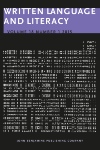
Written Language and Literacy
Bridging Theory and Practice in Written Language ResearchWritten Language and Literacy is a leading academic journal that has been at the forefront of language and literacy research since its inception in 1998. Published by John Benjamins Publishing Co in the Netherlands, this journal provides a platform for innovative and rigorous studies exploring the intersections of language, literacy, and cognitive processes. With an impressive impact factor and classified in the Q2 category for Linguistics and Language, it offers valuable insights and methodologies that contribute significantly to the field. The journal ranks 498th out of 1088 in Arts and Humanities and 577th out of 1167 in Social Sciences, placing it firmly within the academic conversation on language studies. Though it does not offer open access, it remains highly sought after by researchers, professionals, and students, ensuring a rich collection of knowledge essential for advancing literacy and language practices in diverse contexts.

Language Learning in Higher Education
Fostering scholarly dialogue on language pedagogy.Language Learning in Higher Education is a prominent academic journal published by DE GRUYTER MOUTON, dedicated to exploring the intricate dynamics of language acquisition and pedagogical practices within the higher education context. With a robust ISSN: 2191-611X and E-ISSN: 2191-6128, this journal provides a platform for innovative research that addresses contemporary challenges and methodologies in language education. The journal enjoys a favorable reputation in the academic community, as evidenced by its ranks in the Scopus database, where it holds a position in the 67th percentile for Language and Linguistics and is classified in the Q3 and Q2 quartiles across relevant education and linguistics categories. Since its convergence in 2017, Language Learning in Higher Education aims to enrich scholarly discourse by publishing high-quality articles that foster insights into effective language learning strategies, thus serving as an essential resource for researchers, educators, and students committed to enhancing language education. The journal's editorial team is devoted to advancing the field through rigorous peer-review processes and welcomes contributions that push the boundaries of language learning research.
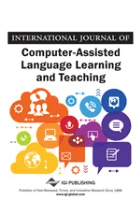
International Journal of Computer-Assisted Language Learning and Teaching
Bridging disciplines for effective language education.Welcome to the International Journal of Computer-Assisted Language Learning and Teaching, a premier publication by IGI Global dedicated to advancing the interdisciplinary research at the intersection of linguistics, education, and computer science. With an ISSN of 2155-7098 and an E-ISSN of 2155-7101, this journal aims to provide a platform for innovative studies on the implementation and effectiveness of technology in language learning and teaching. The journal has earned notable recognition within its field, securing a Q1 ranking in Linguistics and Language and strong placements across several categories in the 2023 Scopus Ranks, including a Q3 classification in Computer Science Applications and Computer Vision and Pattern Recognition. Researchers and educators are encouraged to contribute their findings to foster dialogue around effective computer-assisted methodologies and instructional practices. Although the journal is not open access, it remains a vital resource for researchers, professionals, and students seeking to enhance the efficacy of language education through technological innovation.
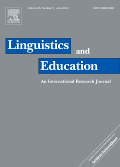
Linguistics and Education
Shaping Educational Policy with Linguistic ExpertiseLinguistics and Education, published by Elsevier, is a premier journal dedicated to advancing the understanding of the intersections between linguistics and educational practices. With its ISSN 0898-5898 and E-ISSN 1873-1864, this journal has established itself as a significant platform since its inception in 1988, continuing to produce impactful research up to 2024. It enjoys a prestigious Q1 ranking in both the Education and Linguistics and Language categories, reflecting its high-quality contributions and leading role in the field. The journal’s Scopus rankings further underscore its influence, being placed in the 87th percentile for Arts and Humanities in Language and Linguistics, and the 86th percentile in Social Sciences in Linguistics and Language. Although it operates under traditional subscription access, its contributions are essential for researchers, professionals, and students alike, making substantial strides in the understanding of language, learning environments, and pedagogical strategies. The journal's objective is to foster interdisciplinary dialogue and disseminate innovative research that informs educational policy and practice.

JOURNAL OF LITERACY RESEARCH
Connecting theory and application in the world of literacy.JOURNAL OF LITERACY RESEARCH is a leading scholarly journal published by SAGE Publications Inc., dedicated to advancing the field of literacy studies through rigorous research and critical analysis. With an impact factor reflecting its high-quality contributions, this journal has achieved Q1 rankings in both Education and Linguistics and Language, positioning it among the top-tier publications in these fields. The journal has a comprehensive scope that includes various aspects of literacy research, bridging theoretical frameworks and practical applications. Researchers, educators, and students will find valuable insights in its articles, addressing critical issues from emergent literacy to adult education in diverse contexts. Available as an open access resource, the JOURNAL OF LITERACY RESEARCH ensures that cutting-edge research is accessible to a global audience, fostering an inclusive environment for disseminating knowledge and supporting literacy initiatives worldwide. For more information, visit the journal's page at [SAGE Publications](https://journals.sagepub.com/home/jlr).
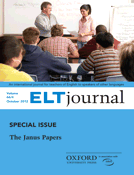
ELT Journal
Illuminating the Path to Effective Language AcquisitionELT Journal, published by Oxford University Press, is a premier academic journal dedicated to the fields of Educational Psychology, Linguistics, and Language, boasting an esteemed Q1 category ranking across these disciplines. Since its inception in 1946, the journal has served as a vital platform for researchers and educators, offering insights into English Language Teaching (ELT) and the evolving pedagogical practices that influence language acquisition and literacy development. With an impressive Scopus ranking placing it in the 95th percentile within the Arts and Humanities (Linguistics and Language), ELT Journal not only contributes to academic discourse but also bridges theoretical frameworks with practical applications in educational settings. Although it does not currently offer Open Access, the journal remains essential for professionals and students alike, eager to stay abreast of the latest research trends and innovations in the global ELT landscape. For those committed to advancing their understanding of language education, the journal's diverse range of articles and case studies provide invaluable resources.
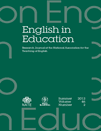
English in Education
Transforming Perspectives on Language and Literature in EducationEnglish in Education, published by Taylor & Francis Ltd, is a premier journal dedicated to the broad field of education, with a specific focus on the interplay of language, literature, and pedagogy. Since its inception in 1964, this esteemed journal has become a vital resource for researchers, educators, and students alike, offering a platform for innovative research and scholarly discourse. With an impressive impact factor and categorized in the top quartiles of both Linguistics and Language, and Literature and Literary Theory, it ranks among the top journals in its field, denoting its significance and influence. The journal aims to advance understanding and practice in English education through rigorous peer-reviewed articles, theoretical explorations, and empirical studies that address contemporary challenges and developments in these intertwined disciplines. The journal’s commitment to excellence is reflected in its Scopus rankings, highlighting its critical role in fostering research that informs and enriches educational practices. Although currently not open access, English in Education remains an essential outlet for professionals seeking to contribute to the evolving landscape of English language and literature education.

Turkish Journal of Education
Shaping the Future of Education Through Research and DialogueTurkish Journal of Education, published by MEHMET TEKEREK, is a prominent Open Access journal dedicated to advancing the field of education research since its establishment in 2012. With an ISSN of 2147-2858, this journal exemplifies a commitment to disseminating high-quality research that addresses contemporary issues and innovative practices in education. It serves as a vital resource for researchers, educators, and policymakers interested in the educational landscape of Turkey and beyond. The journal promotes accessibility to knowledge by offering free access to its articles, fostering a collaborative and inclusive academic environment. By engaging with a diverse range of topics, from pedagogical theories to educational technology, the Turkish Journal of Education strives to contribute significantly to the field and stimulate scholarly debate among its readers.
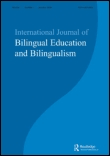
International Journal of Bilingual Education and Bilingualism
Bridging languages and cultures in education.The International Journal of Bilingual Education and Bilingualism is a premier publication dedicated to advancing the field of bilingual education and language acquisition. Published by Routledge Journals, Taylor & Francis Ltd, this UK-based journal features a robust collection of research articles, reviews, and theoretical discussions, making it essential reading for educators, linguists, and policymakers. With an impressive impact factor that underscores its influence, it holds top quartile rankings in both Education and Linguistics and Language categories for 2023, reflecting its high-quality content and academic rigor. The journal covers pivotal topics from bilingual teaching methodologies to the cognitive implications of multilingualism, catering to the needs of a diverse and global audience. Its Scopus ranks further emphasize its esteemed position within the academic community, ranking 18th in Language and Linguistics and 21st in Social Sciences’ Linguistics. By providing insights into contemporary challenges and innovations in bilingual education, the International Journal of Bilingual Education and Bilingualism continues to be a vital resource for researchers, professionals, and students alike, inspiring new directions in bilingual education research.